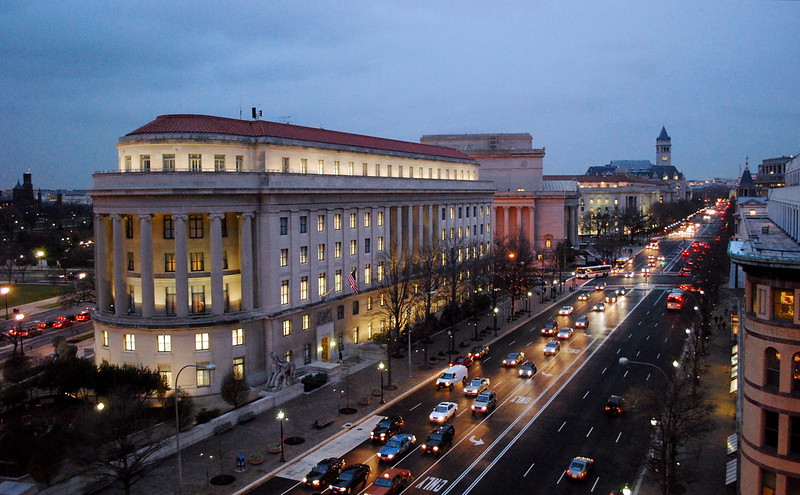As President-elect Donald Trump’s administration takes shape, the Federal Trade Commission (FTC) is set for a transformative period under newly nominated Chair Andrew Ferguson.
This transition follows the departure of Lina Khan as head of the agency, whose tenure as chair was characterized by a bold interpretation of antitrust laws and heightened scrutiny of major technology companies.
During Khan’s leadership, the FTC pursued aggressive regulatory actions, introduced landmark policies, such as efforts to ban non-compete clauses, and pursued high-profile lawsuits, including a 2023 antitrust case against Amazon, which alleged the company illegally maintained monopoly power through anticompetitive practices. The agency also cracked down on mergers, resulting in the collapse of major deals like Adobe’s acquisition of Figma and Nvidia’s bid for Arm.
“Lina Khan has raised the profile of antitrust significantly,” noted Kevin Yingling, an antitrust partner at Freshfields US LLP and former lead antitrust counsel for global M&A at Google. “She picked up the baton and took a more aggressive and perhaps adversarial approach to M&A compared to the selective enforcement of the first Trump administration.”
The nomination of Ferguson, as well as Mark Meador as a commissioner, suggest a recalibration of the FTC’s priorities under Trump. Ferguson, a Republican commissioner with a reputation for measured conservatism, has signaled he wants to maintain scrutiny over Big Tech, but advocates for a less adversarial regulatory posture. Meador’s addition is expected to solidify the Republican majority on the commission, which could result in a more business-friendly approach to antitrust enforcement.
“Ferguson has made it clear that the tech sector still deserves scrutiny,” said Yingling. “Even with a new administration, there will likely be significant enforcement in the tech space.”
Ferguson vowed to “put an end to Big Tech’s vendetta against competition and free speech,” in a post on X.
The FTC is composed of five commissioners, with a maximum of three from the same political party to balance partisan interests. The chair, serving as the agency’s chief operating officer, plays a critical role in shaping policy and mediating disputes.
William Kovacic, former FTC chair under President George W. Bush, emphasized the importance of this balance.
“The atmosphere depends a lot on how well people get along and how severe their policy differences are,” Kovacic said.
Trump’s nomination of Ferguson, a current commissioner, as chair allows him to take immediate operational control. However, filling the vacancy with Meador requires Senate confirmation, which could take months. During this time, the FTC may operate with a 2-2 partisan split, delaying the Republican majority necessary to fully implement the administration’s agenda.
While broader hostility toward mergers may ease under Ferguson’s leadership, bipartisan interest in regulating Big Tech’s market power is expected to persist.
“The nominees appear to be committed to continuing the FTC’s aggressive oversight of the leading big tech companies,” noted Kovacic. “This means full speed ahead on the FTC’s monopolization cases against Meta and Amazon.”
Ferguson, a former Virginia solicitor general and clerk for Supreme Court Justice Clarence Thomas, has previously dissented from Khan’s regulatory efforts, including proposed bans on non-compete clauses and subscription cancellation rules.
“It’s not a green light for all mergers, but there will likely be less hostility overall,” Yingling said regarding Khan’s expected departure from the chair position. He also suggested that the 2023 Merger Guidelines introduced under Khan could see revisions under the new FTC leadership. These guidelines significantly lowered market share thresholds for presuming mergers as anti-competitive and expanded the scope to include theories of harm beyond consumer welfare.
Gail Slater, Trump’s nominee for the Department of Justice Antitrust Division, may adopt a more tempered approach to these guidelines. “You could see some pullbacks and some tweaks, but I wouldn’t see fundamental changes to them,” Yingling said.
Trump reaffirmed his administration’s commitment to antitrust actions against Big Tech in a Dec. 4 Truth Social post, saying that under Slater’s guidance, the DOJ would persist in prosecuting dominant firms to prevent them from infringing on the rights of Americans and smaller tech companies.
Ferguson’s leadership is expected to involve a nuanced approach to antitrust enforcement.
While the focus on Big Tech’s market dominance will remain, Ferguson’s statements have highlighted a desire to promote competition without stifling technological advancements.
Beyond tech, Ferguson’s leadership may prompt the FTC to prioritize issues in healthcare and agriculture. Consolidation in these sectors, particularly concerning consumer access and costs, remains a bipartisan concern.
Still, Trump’s leadership leaves room for uncertainty. Kovacic emphasized Trump’s mixed signals, noting that he’s “given every indication of wanting to sustain the antitrust program against big tech.” But at the same time, efforts to streamline government budgets under the newly-coined Department of Government Efficiency could impact the agency’s capacity to enforce its broader mandate.
As the antitrust landscape continues to evolve, stakeholders across industries will be closely watching the FTC’s moves under Ferguson’s leadership. With global regulators increasingly coordinating efforts to tackle anticompetitive practices in the tech sector, the U.S. agency’s direction under Ferguson could influence collaborative efforts with counterparts in the European Union and other jurisdictions.


